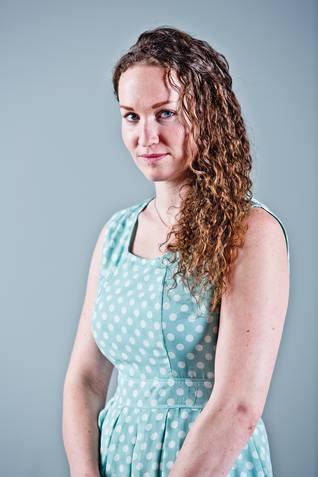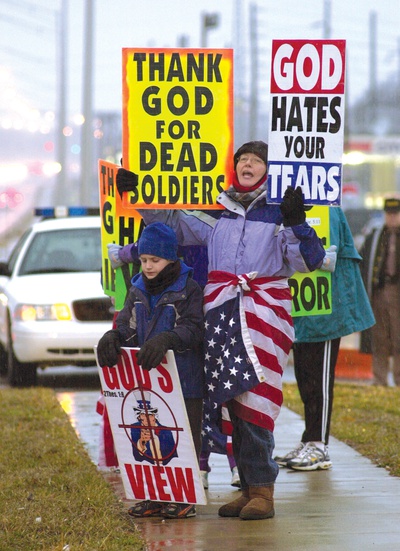Monday, March 30, 2015 | 2 a.m.
The first time Megan Phelps-Roper came to Las Vegas, it was May 2004 and she was here to picket a live recording of the Howard Stern show at the Hard Rock Hotel.
Standing beside her two younger siblings, 18-year-old Phelps-Roper wore a T-shirt emblazoned with the phrase for which her family is most famous: God hates fags.
Until about two years ago, Phelps-Roper, now 29, was a member of the infamous Westboro Baptist Church in Topeka, Kan. The granddaughter of founding member Fred Phelps — “Gramps” to her — Phelps-Roper’s earliest memory is reading the Bible with her family at age 3. She participated in her first protest at 5.
Other than the Ku Klux Klan, the Westboro Baptist Church is probably the most recognizable hate group in America. The church is best known for its anti-gay rhetoric, but church members also protest soldiers’ funerals, Jews, Catholics and many others. The church gained worldwide attention in 1998 for picketing the funeral of Matthew Shepard, a gay college student who was brutally beaten in Laramie, Wyo., and died six days later in Fort Collins, Colo.
Phelps, who died last year, preached that society’s increasing acceptance of LGBTQ people brought divine catastrophe upon the United States, from the 9/11 terrorist attacks to the deaths of soldiers in Iraq and Afghanistan.
In his view, it was the Westboro Baptist Church’s job to warn the world about damnation. In others’ view, Phelps was the leader of a hate group.
The number of hate groups in the United States has been on the rise over the past decade, motivated by anger and fear over the nation’s ailing economy, an influx of nonwhite immigrants and a diminishing white majority. People increasingly are flocking to like-minded groups, some with extreme radicalized agendas, that make them feel safe, in control and significant.
The Internet makes hate groups’ quest easier. Research has found that the rise of Internet media has had a polarizing effect on people, who are directed through their social networks toward sites with perspectives they already believe. The democracy and anonymity of the Web, in many cases, allow hate and radicalization to spread.
It’s not hard to put such a surge into the context of a radicalizing world. In the Middle East, ISIS has used an extremist interpretation of certain elements of Islam to justify killing thousands of people. In Paris, a misguided search for significance led two brothers to set out on a jihad, which they highlighted with the murder of 12 people, including a Muslim policeman and several journalists at satirical magazine Charlie Hebdo.
In Nevada, such radicalization erupted last year 70 miles northeast of Las Vegas when rancher Cliven Bundy and a group of militia members embroiled in a battle with the Bureau of Land Management over grazing fees trained their rifles on federal agents. Two months later, two Bundy supporters who were turned away from the rancher’s compound for being too radical shot and killed two Metro Police officers execution-style, then left an anti-government message and a swastika on their bodies.
• • •
From birth to age 26, everything in Phelps-Roper’s life — going to school, meeting new people, etc. — centered on bringing the Westboro Baptist Church’s message to the world.
Phelps and her siblings lived on a compound in Topeka with the rest of the congregation, most of whom were family members. Her grandfather taught that everyone outside was disobedient and on a path to hell.
“Once you’ve been inculcated with this ideology from the time you’re tiny, and you have answers to everything and you’ve tied your salvation and your life into believing these doctrines, it’s really hard to let them go,” Phelps-Roper said.
But in November 2012, Phelps-Roper did let them go. She and her younger sister Grace left the church.
When Phelps-Roper was in Las Vegas earlier this month, instead of picketing she spoke at the local chapter of the Anti-Defamation League and the Gay and Lesbian Community Center of Southern Nevada.
To fill the ideological vacuum that was created when she broke from the church, Phelps-Roper has traveled the country to learn from the very groups Westboro protested, replacing the church’s policy of hatred with more nuanced perspectives from anyone willing to talk to her.
In a society that is increasingly going the other direction, Phelps-Roper is deliberately de-radicalizing.
“In the specifics it seems unique,” Phelps-Roper said. “But a lot of people grow up with ideas and prejudices that they were taught and eventually … reorient themselves.”
• • •
The first cracks in Phelps-Roper’s ideology appeared in middle school. As she became better friends with children on her school volleyball team and in musical theater, she became less comfortable with the idea that all nonmembers were evil.
“But then that very night you’d be reading the Bible and seeing that all these horrible judgments apply to these people, so it doesn’t matter how you feel or what you think,” Phelps-Roper said. “If you have a thought or a feeling against these doctrines, then
it’s a thought or a feeling against God himself and you’d better bring it into line.”
In 2009, Phelps-Roper became responsible for spreading the church’s message through social media. She joined Twitter and used the service to drum up publicity for the church by starting debates with celebrities and other users with large followings.
People typically responded to the hateful messages she sent in one of two ways: They dismissed her as absurd or became extremely angry.
That’s until she tweeted at David Abitbol, founder of Jewish culture blog Jewlicious. Phelps-Roper found Abitbol on a list of the most influential Jews on Twitter and sent him a message demanding that Jews repent for their sins.
After Abitbol realized Phelps-Roper wasn’t joking, he initially responded with anger. But after the pair exchanged a few more messages, Abitbol switched strategies and began engaging Phelps-Roper with something she’d studied every day since childhood — theology. The two kept up a relationship over Twitter and email for months.
In spring 2010, Wesboro Baptist Church picketed Abitbol at a Jewlicious festival in Long Beach, Calif. When Abitbol came to speak to Phelps-Roper, she was standing next to her sister, then a teenager, who was holding a sign that read Your Rabbi is a whore.
Nine months later, Abitbol and Phelps-Roper met again, this time in New Orleans, where Phelps-Roper was picketing the Jewish General Assembly. Abitbol brought Phelps-Roper halva, an Israeli dessert from a market near his home in Jerusalem. Phelps-Roper brought him kosher chocolate and held a “God hates Jews” sign.
The Westboro Baptist Church’s primary strategy long has been provocation. The church doesn’t mind if the media gets its theology wrong or if the public misinterprets its motives. All the members care about is getting their block-lettered messages of hate into viral photographs.
Abitbol’s strategy was different.
“There was this human connection there,” Phelps-Roper said.
Shortly after, Abitbol asked Phelps-Roper about a Westboro Baptist Church sign that read Death penalty for fags. Based on a literal, and increasingly unpopular, interpretation of the Bible, the church taught homosexuality was a sin worthy of death. Abitbol asked Phelps-Roper why the church didn’t advocate the same punishment for a woman in the church who had a child out of wedlock, another sin. And, Abitbol asked, doesn’t the death penalty prevent people from repenting, the ultimate goal?
Then he cited John 8, in which Jesus advises that “he who is without sin can cast the first stone.”
“People had thrown both of those arguments at us before, but never in concert like that,” Phelps-Roper said. “It’s kind of this really subtle point of theology, but … this was the first time I could see we were wrong about something.”
Phelps-Roper and her family members are highly educated. Many of her relatives are lawyers. But when she brought Abitbol’s argument home, no one could dispute it effectively. Phelps-Roper decided to stop holding the sign.
• • •
Over time, Phelps-Roper found more theological discrepancies in the church’s teachings, eventually so many she couldn’t brush them off. Her sister Grace followed a similar path.
But even once she and Grace had resolved to leave, it wasn’t easy. Phelps-Roper worried her eternal soul would be lost. She had seen other people leave — more than 20 have defected from the church — and saw how they were talked about afterward. She knew she wouldn’t be allowed a relationship with the family that remained.
But she’s careful not to spend too much time talking about such hardships. Phelps-Roper is smart, and she knows what she did in the church hurt a lot people. She isn’t seeking gratitude or publicity.
Her mission now is to see what good she can do in the world. As someone who spent the first 26 years of her life talking to people, taking a similar approach made the most sense.
“If all those words for all those years could have that much of an impact, then why not words now?” she asked.
When Phelps-Roper isn’t in South Dakota, where she works for a title company, she travels across the United States and Canada to tell her story, usually to the very groups she has hurt most. She has spoken in front of women’s studies classes, to religious groups, on interfaith panels and to LGBTQ folks. She talks about her experience in the church and why she decided to leave. She hopes it’s healing.
Jolie Brislin, Nevada's regional director of the Anti-Defamation League, said it has been for the local Jewish community.
“She gives hope that ideas can change and perspectives can change and people can continue to be challenged to think a different way,” Brislin said.
At the LGBTQ center, 120 people turned out to see Phelps-Roper speak and take part in a panel discussion afterward. The crowd was more than twice the size of most at the center’s events.
“People were looking for an explanation, and that’s what Megan gave them,” center director Michael Dimengo said.
The response isn’t always so positive. A few months after she left the church, Phelps-Roper was speaking to a college class when a young woman seated toward the back raised her hand. An LGBTQ friend of hers had committed suicide. Church members preach no redemption for LGBTQ people, just the death penalty and hell, so why should Phelps-Roper get a shot at redemption?
“She’s absolutely right,” Phelps-Roper said. “I can’t undo it. But I can try to do something else, something more positive and more helpful and more healing.”
• • •
A few weeks ago, Phelps-Roper was watching a military movie that ended with a montage of photos of the real soldiers on which the movie’s characters were based. It reminded Phelps-Roper of the times she had picketed soldiers’ funerals.
At the time, she didn’t think much of it. Pickets are just words on signs. If people don’t like them, they can look away.
“We always discounted and dismissed the harm we did to other people,” Phelps-Roper said. “Other people’s pain meant nothing to us.”
To prepare for each protest, church members read dead soldiers’ obituaries. Their pictures never bothered her. But now, seeing the photos from a new perspective — from outside the church — and understanding that the soldiers were real people with families is difficult.
“It’s just this feeling of total shame, like how could we possibly have done that?” Phelps-Roper said, crying. “How did we think that was right?”



Join the Discussion:
Check this out for a full explanation of our conversion to the LiveFyre commenting system and instructions on how to sign up for an account.
Full comments policy